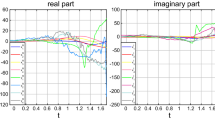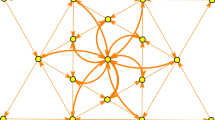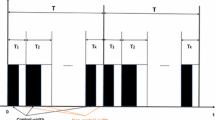Abstract
This article studied the exponential stability of stochastic functional differential systems based on directed networks, utilizing impulsive control with multiple delays. The impulsive control considered in this article is related to multi-past states since the impact of input delay for stability. It is worth mentioning that multi-link networks are constructed as extensions of single-link or double-link networks. The time-varying coupling strength is considered, which is generally but rarely considered in network stability. Several criteria, which are related to the network topology, input delays, and involved impulsive control schemes, are obtained based on Lyapunov-Razumikhin method and graph theory. Subsequently, the stability of multi-link stochastic time-varying networks with time delays is studied using delayed impulsive control. Finally, the theoretical results are applied to the oscillator system, and some numerical simulations are given.








Similar content being viewed by others
References
Lu JH, Chen GR (2005) A time-varying complex dynamical network model and its controlled synchronization criteria. IEEE Trans Autom Control 50(6):841–846. https://doi.org/10.1109/TAC.2005.849233
Zhang JB, Zheng Y, Qi DK, Li RY, Yi XW, Li TR (2018) Predicting citywide crowd flows using deep spatio-temporal residual networks. Artif Intell 259:147–166. https://doi.org/10.1016/j.artint.2018.03.002
Albert R, Barabasi AL (2002) Statistical mechanics of complex networks. Rev Mod Phys 74:47–97. https://doi.org/10.1103/RevModPhys.74.47
Zhao X, Liu LD, Wang H, Fan M (2023) Ecological effects of predator harvesting and environmental noises on oceanic coral reefs. Bull Math Biol 85(7):59. https://doi.org/10.1007/s11538-023-01166-z
Li WX, Qi XH, Pan M, Wang K (2014) Razumikhin-type theorems on exponential stability of stochastic functional differential equations on networks. Neurocomputing 131:278–285. https://doi.org/10.1016/j.neucom.2013.10.017
Guo HH, Liu J, Ahn CK, Wu YB, Li WX (2022) Dynamic event-triggered impulsive control for stochastic nonlinear systems with extension in complex networks. IEEE Trans Circ Syst I-Regul Pap 69(5):2167–2178. https://doi.org/10.1109/TCSI.2022.3141583
Yang N, Zhang S, Su H (2023) Event-triggered impulsive control for stability of stochastic delayed complex networks under deception attacks. Eng Appl Artif Intell 121:105953. https://doi.org/10.1016/j.engappai.2023.105953
Chiang M, Low SH, Calderbank AR, Doyle JC (2007) Layering as optimization decomposition: a mathematical theory of network architectures. Proc IEEE 95(1):255–312. https://doi.org/10.1109/JPROC.2006.887322
Xu Y, Gao S, Li WX (2021) Exponential stability of fractional-order complex multi-links networks with aperiodically intermittent control. IEEE Trans Neural Netw Learn Syst 32(9):4063–4074. https://doi.org/10.1109/TNNLS.2020.3016672
Zhang N, Wang XY, Li WX (2022) Stability for multi-linked stochastic delayed complex networks with stochastic hybrid impulses by Dupire It’o formula. Nonlinear Anal-Hybrid Syst 45:101200. http://doi.org/10.1016/j.nahs.2022.101200
Yang N, Gao RY, Su H (2022) Stability of multi-links complex-valued impulsive stochastic systems with Markovian switching and multiple delays. Chaos Solit Fract 164:112623. https://doi.org/10.1016/j.chaos.2022.112623
Luo TJ (2019) Stabilization of multi-group models with multiple dispersal and stochastic perturbation via feedback control based on discrete-time state observations. Appl Math Comput 354:396–410. https://doi.org/10.1016/j.amc.2019.01.052
Luo TJ, Wang Q, Jia QL, Xu Y (2021) Asymptotic and finite-time synchronization of fractional-order multiplex networks with time delays by adaptive and impulsive control. Neurocomputing 493:445–461. https://doi.org/10.1016/j.neucom.2021.12.087
Li XN, Wu HQ, Cao JD (2022) Prescribed-time synchronization in networks of piecewise smooth systems via a nonlinear dynamic event-triggered control strategy. Math Comput Simul 203:647–668. https://doi.org/10.1016/j.matcom.2022.07.010
Li RH, Wu HQ, Cao JD (2022) Impulsive exponential synchronization of fractional-order complex dynamical networks with derivative couplings via feedback control based on discrete time state observations. Acta Math Sci 42(2):737–754. https://doi.org/10.1007/s10473-022-0219-4
Li XN, Wu HQ, Cao JD (2022) A new prescribed-time stability theorem for impulsive piecewise-smooth systems and its application to synchronization in networks. Appl Math Model 115:385–397. https://doi.org/10.1016/j.apm.2022.10.051
Li XD, Cao JD, Ho DWC (2020) Impulsive control of nonlinear systems with time-varying delay and applications. IEEE T Cybern 50(6):2661–2673. https://doi.org/10.1109/TCYB.2019.2896340
Li XD, Zhang TX, Wu JH (2022) Input-to-state stability of impulsive systems via event-triggered impulsive control. IEEE T Cybern 52(7):7187–7195. https://doi.org/10.1109/TCYB.2020.3044003
Yang ZC, Xu DY (2007) Stability analysis and design of impulsive control systems with time delay. IEEE Trans Autom Control 52(8):1448–1454. https://doi.org/10.1109/TAC.2007.902748
Li XD, Peng DX, Cao JD (2020) Lyapunov stability for impulsive systems via event-triggered impulsive control. IEEE Trans Autom Control 65(11):4908–4913. https://doi.org/10.1109/TAC.2020.2964558
Xia XN, Zhang TP, Kang GP, Fang Y (2022) Adaptive control of uncertain nonlinear systems with discontinuous input and time-varying input delay. IEEE Trans Syst Man Cybern -Syst 52(11):7248–7258. https://doi.org/10.1109/TSMC.2022.3158617
Li XD, Song SJ (2017) Stabilization of delay systems: delay-dependent impulsive control. IEEE Trans Autom Control 62(1):406–411. https://doi.org/10.1109/TAC.2016.2530041
Yang XS, Yang ZC, Nie XB (2014) Exponential synchronization of discontinuous chaotic systems via delayed impulsive control and its application to secure communication. Commun Nonlinear Sci Numer Simul 19(5):1529–1543. https://doi.org/10.1016/j.cnsns.2013.09.012
Lv XX, Cao JD, Li XD, Abdel-Aty M, Al-Juboori UA (2021) Synchronization analysis for complex dynamical networks with coupling delay via event-triggered delayed impulsive control. IEEE T Cybern 51(11):5269–5278. https://doi.org/10.1109/TCYB.2020.2974315
Gupta P, Kumar PR (1997) A system and traffic dependent adaptive routing algorithm for Ad hoc networks. In: Proceedings of the 36th IEEE Conference on Decision and Control 3:2375–2380. http://doi.org/10.1109/CDC.1997.657141
Liu Y, Hu WB, Wang JL (2023) Stabilization of highly nonlinear stochastic time-varying coupled systems via aperiodically intermittent control. IEEE Trans Control Netw Syst 10(2):765–776. https://doi.org/10.1109/TCNS.2022.3210302
Wu YB, Li HZ, Li WX (2021) Intermittent control strategy for synchronization analysis of time-varying complex dynamical networks. IEEE Trans Syst Man Cybern -Syst 51(5):3251–3262. https://doi.org/10.1109/TSMC.2019.2920451
West DB (2001) Introduction to graph theory. Prentice Hall, Upper Saddle River
Li HY, Fang J, Li XF, Rutkowski L, Huang TW (2020) Event-triggered impulsive synchronization of discrete-time coupled neural networks with stochastic perturbations and multiple delays. Neural Netw 132:447–460. https://doi.org/10.1016/j.neunet.2020.09.012
Tang HA, Duan SK, Hu XF, Wang LD (2018) Passivity and synchronization of coupled reaction-diffusion neural networks with multiple time-varying delays via impulsive control. Neurocomputing 318:30–42. https://doi.org/10.1016/j.neucom.2018.08.005
Mao XR (2007) Stochastic differential equations and applications. Horwood, Chichester
Li MY, Shuai ZS (2010) Global-stability problem for coupled systems of differential equations on networks. J Differ Equ 248(1):1–20. https://doi.org/10.1016/j.jde.2009.09.003
Bao JH, Mao XR, Yin G, Yuan CG (2011) Competitive Lotka-Volterra population dynamics with jumps. Nonlinear Anal Theory Methods Appl 74(17):6601–6616. https://doi.org/10.1016/j.na.2011.06.043
Liu Y, Guo Y, Li WX (2016) The stability of stochastic coupled systems with time delays and time-varying coupling structure. Appl Math Comput 290:507–520. https://doi.org/10.1016/j.amc.2016.06.029
Huang LR, Xu S (2023) Impulsive stabilization of systems with control delay. IEEE Trans Autom Control 68(3):1784–1791. https://doi.org/10.1109/TAC.2022.3155666
Wu YB, Fu SX, Li WX (2019) Exponential synchronization for coupled complex networks with time-varying delays and stochastic perturbations via impulsive control. J Frankl Inst-Eng Appl Math 356(1):492–513. https://doi.org/10.1016/j.jfranklin.2018.11.003
Acknowledgements
This work is supported by the Natural Science Foundation of Shandong Province, China No. ZR2021MF032.
Author information
Authors and Affiliations
Corresponding author
Ethics declarations
Conflict of interest
The authors declare that they have no known competing financial interests or personal relationships that could have appeared to influence the work reported in this article.
Data availability
No data were used for the research described in the article.
Additional information
Publisher's Note
Springer Nature remains neutral with regard to jurisdictional claims in published maps and institutional affiliations.
Rights and permissions
Springer Nature or its licensor (e.g. a society or other partner) holds exclusive rights to this article under a publishing agreement with the author(s) or other rightsholder(s); author self-archiving of the accepted manuscript version of this article is solely governed by the terms of such publishing agreement and applicable law.
About this article
Cite this article
Yang, N., Chen, J. & Su, H. Multi-delayed impulsive stability for stochastic multi-link complex networks with time-varying coupling structure. Neural Comput & Applic 36, 3555–3568 (2024). https://doi.org/10.1007/s00521-023-09170-z
Received:
Accepted:
Published:
Issue Date:
DOI: https://doi.org/10.1007/s00521-023-09170-z




